Self Efficacy Assesment Report
VerifiedAdded on 2022/08/25
|7
|1555
|28
AI Summary
Contribute Materials
Your contribution can guide someone’s learning journey. Share your
documents today.
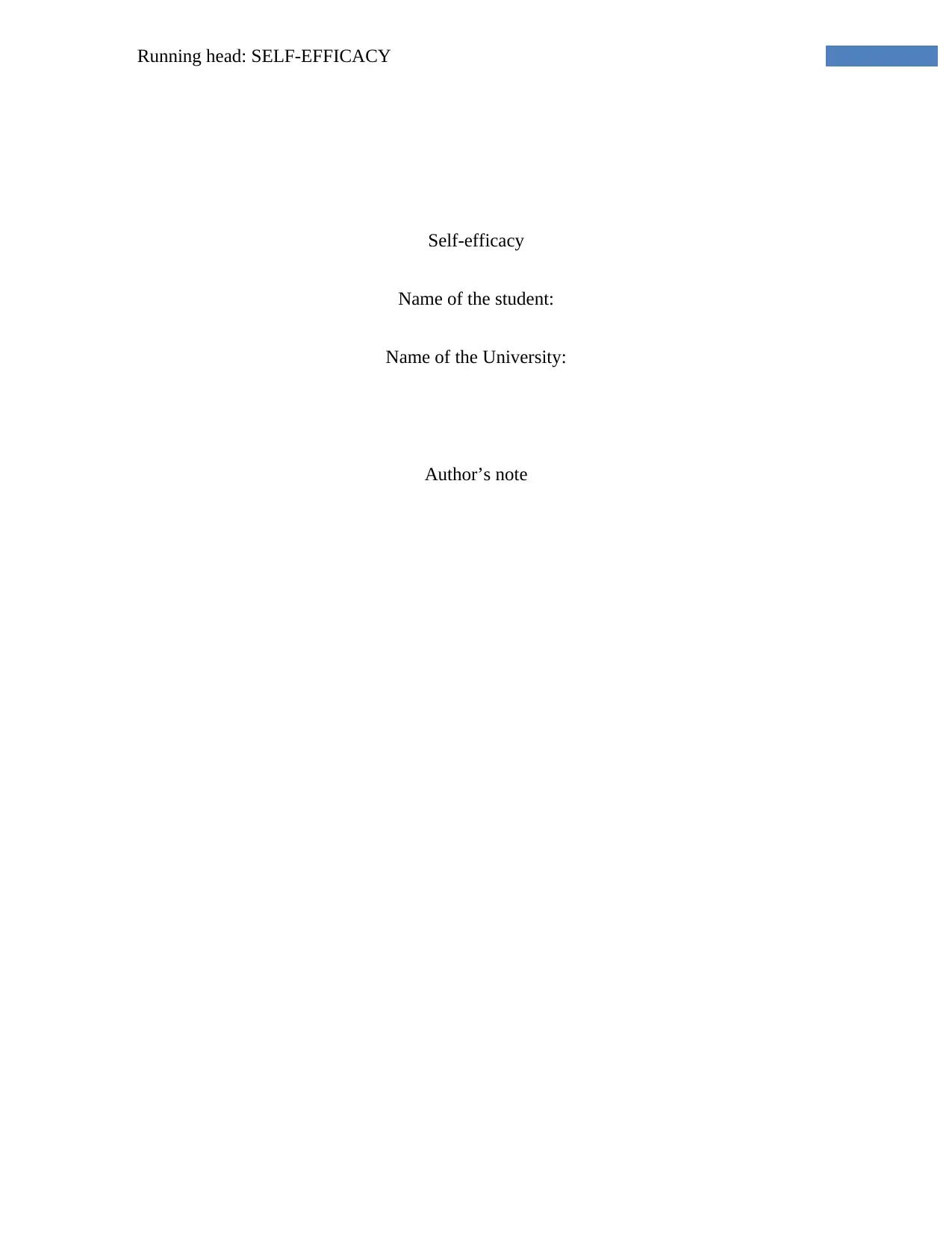
Running head: SELF-EFFICACY
Self-efficacy
Name of the student:
Name of the University:
Author’s note
Self-efficacy
Name of the student:
Name of the University:
Author’s note
Secure Best Marks with AI Grader
Need help grading? Try our AI Grader for instant feedback on your assignments.
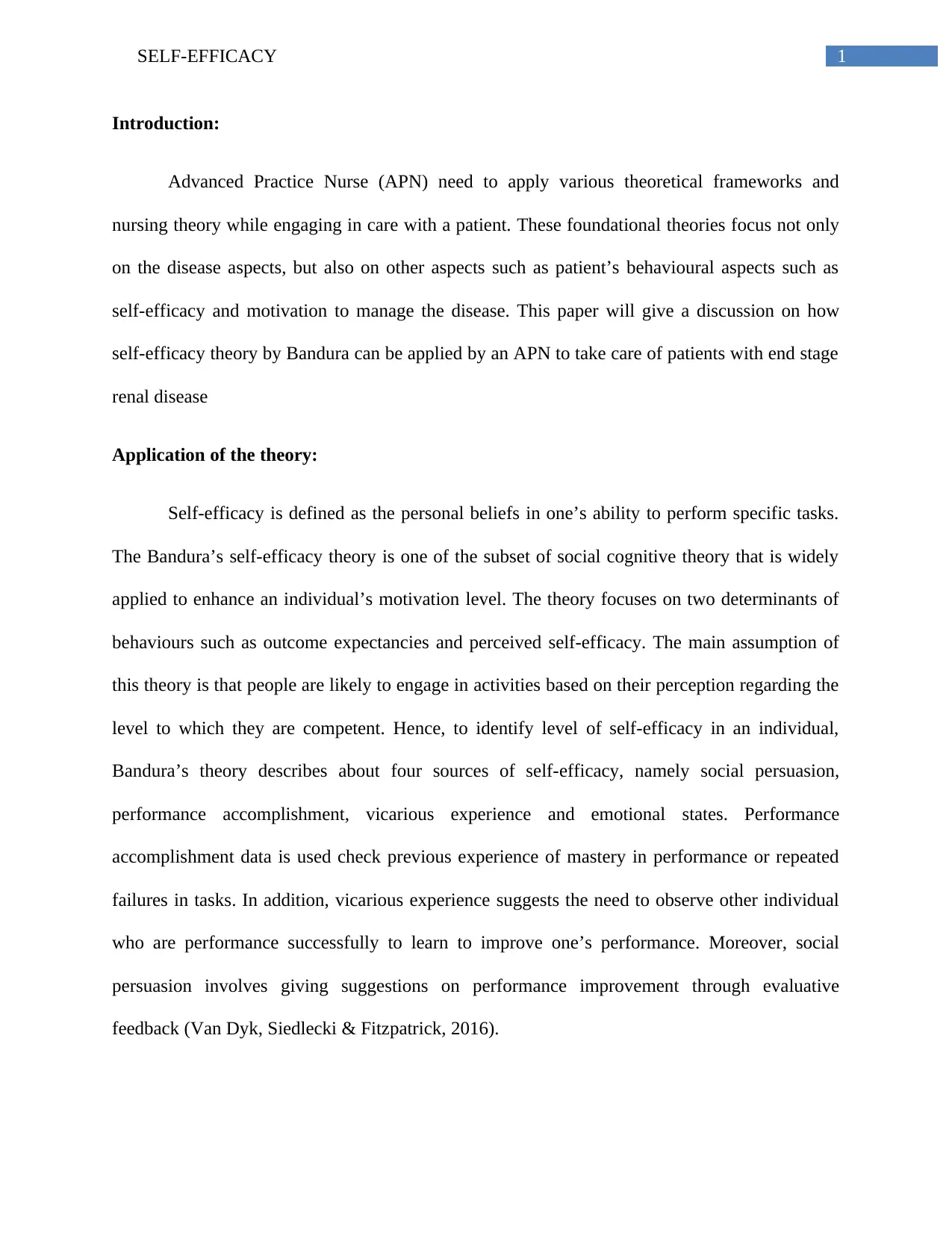
1SELF-EFFICACY
Introduction:
Advanced Practice Nurse (APN) need to apply various theoretical frameworks and
nursing theory while engaging in care with a patient. These foundational theories focus not only
on the disease aspects, but also on other aspects such as patient’s behavioural aspects such as
self-efficacy and motivation to manage the disease. This paper will give a discussion on how
self-efficacy theory by Bandura can be applied by an APN to take care of patients with end stage
renal disease
Application of the theory:
Self-efficacy is defined as the personal beliefs in one’s ability to perform specific tasks.
The Bandura’s self-efficacy theory is one of the subset of social cognitive theory that is widely
applied to enhance an individual’s motivation level. The theory focuses on two determinants of
behaviours such as outcome expectancies and perceived self-efficacy. The main assumption of
this theory is that people are likely to engage in activities based on their perception regarding the
level to which they are competent. Hence, to identify level of self-efficacy in an individual,
Bandura’s theory describes about four sources of self-efficacy, namely social persuasion,
performance accomplishment, vicarious experience and emotional states. Performance
accomplishment data is used check previous experience of mastery in performance or repeated
failures in tasks. In addition, vicarious experience suggests the need to observe other individual
who are performance successfully to learn to improve one’s performance. Moreover, social
persuasion involves giving suggestions on performance improvement through evaluative
feedback (Van Dyk, Siedlecki & Fitzpatrick, 2016).
Introduction:
Advanced Practice Nurse (APN) need to apply various theoretical frameworks and
nursing theory while engaging in care with a patient. These foundational theories focus not only
on the disease aspects, but also on other aspects such as patient’s behavioural aspects such as
self-efficacy and motivation to manage the disease. This paper will give a discussion on how
self-efficacy theory by Bandura can be applied by an APN to take care of patients with end stage
renal disease
Application of the theory:
Self-efficacy is defined as the personal beliefs in one’s ability to perform specific tasks.
The Bandura’s self-efficacy theory is one of the subset of social cognitive theory that is widely
applied to enhance an individual’s motivation level. The theory focuses on two determinants of
behaviours such as outcome expectancies and perceived self-efficacy. The main assumption of
this theory is that people are likely to engage in activities based on their perception regarding the
level to which they are competent. Hence, to identify level of self-efficacy in an individual,
Bandura’s theory describes about four sources of self-efficacy, namely social persuasion,
performance accomplishment, vicarious experience and emotional states. Performance
accomplishment data is used check previous experience of mastery in performance or repeated
failures in tasks. In addition, vicarious experience suggests the need to observe other individual
who are performance successfully to learn to improve one’s performance. Moreover, social
persuasion involves giving suggestions on performance improvement through evaluative
feedback (Van Dyk, Siedlecki & Fitzpatrick, 2016).
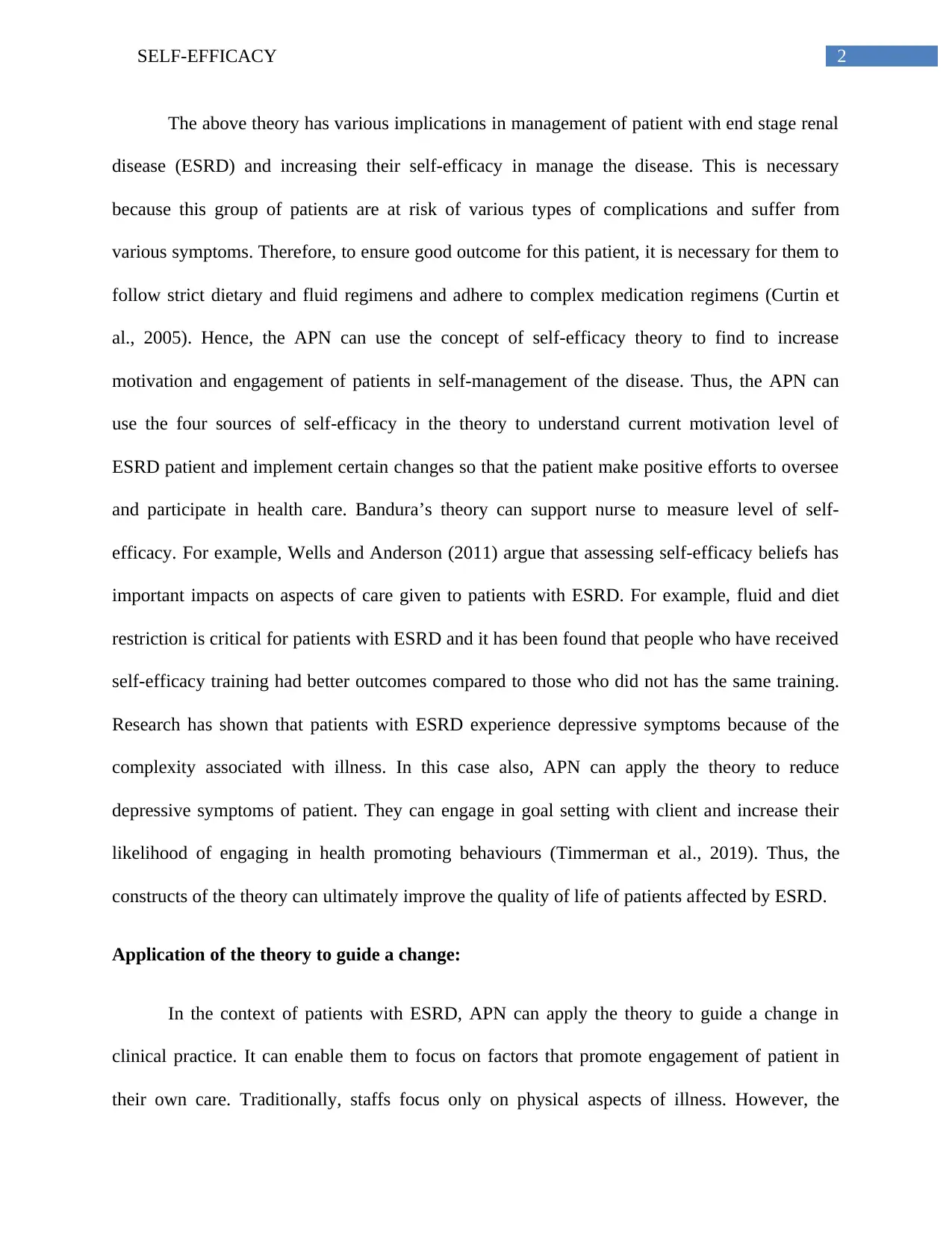
2SELF-EFFICACY
The above theory has various implications in management of patient with end stage renal
disease (ESRD) and increasing their self-efficacy in manage the disease. This is necessary
because this group of patients are at risk of various types of complications and suffer from
various symptoms. Therefore, to ensure good outcome for this patient, it is necessary for them to
follow strict dietary and fluid regimens and adhere to complex medication regimens (Curtin et
al., 2005). Hence, the APN can use the concept of self-efficacy theory to find to increase
motivation and engagement of patients in self-management of the disease. Thus, the APN can
use the four sources of self-efficacy in the theory to understand current motivation level of
ESRD patient and implement certain changes so that the patient make positive efforts to oversee
and participate in health care. Bandura’s theory can support nurse to measure level of self-
efficacy. For example, Wells and Anderson (2011) argue that assessing self-efficacy beliefs has
important impacts on aspects of care given to patients with ESRD. For example, fluid and diet
restriction is critical for patients with ESRD and it has been found that people who have received
self-efficacy training had better outcomes compared to those who did not has the same training.
Research has shown that patients with ESRD experience depressive symptoms because of the
complexity associated with illness. In this case also, APN can apply the theory to reduce
depressive symptoms of patient. They can engage in goal setting with client and increase their
likelihood of engaging in health promoting behaviours (Timmerman et al., 2019). Thus, the
constructs of the theory can ultimately improve the quality of life of patients affected by ESRD.
Application of the theory to guide a change:
In the context of patients with ESRD, APN can apply the theory to guide a change in
clinical practice. It can enable them to focus on factors that promote engagement of patient in
their own care. Traditionally, staffs focus only on physical aspects of illness. However, the
The above theory has various implications in management of patient with end stage renal
disease (ESRD) and increasing their self-efficacy in manage the disease. This is necessary
because this group of patients are at risk of various types of complications and suffer from
various symptoms. Therefore, to ensure good outcome for this patient, it is necessary for them to
follow strict dietary and fluid regimens and adhere to complex medication regimens (Curtin et
al., 2005). Hence, the APN can use the concept of self-efficacy theory to find to increase
motivation and engagement of patients in self-management of the disease. Thus, the APN can
use the four sources of self-efficacy in the theory to understand current motivation level of
ESRD patient and implement certain changes so that the patient make positive efforts to oversee
and participate in health care. Bandura’s theory can support nurse to measure level of self-
efficacy. For example, Wells and Anderson (2011) argue that assessing self-efficacy beliefs has
important impacts on aspects of care given to patients with ESRD. For example, fluid and diet
restriction is critical for patients with ESRD and it has been found that people who have received
self-efficacy training had better outcomes compared to those who did not has the same training.
Research has shown that patients with ESRD experience depressive symptoms because of the
complexity associated with illness. In this case also, APN can apply the theory to reduce
depressive symptoms of patient. They can engage in goal setting with client and increase their
likelihood of engaging in health promoting behaviours (Timmerman et al., 2019). Thus, the
constructs of the theory can ultimately improve the quality of life of patients affected by ESRD.
Application of the theory to guide a change:
In the context of patients with ESRD, APN can apply the theory to guide a change in
clinical practice. It can enable them to focus on factors that promote engagement of patient in
their own care. Traditionally, staffs focus only on physical aspects of illness. However, the
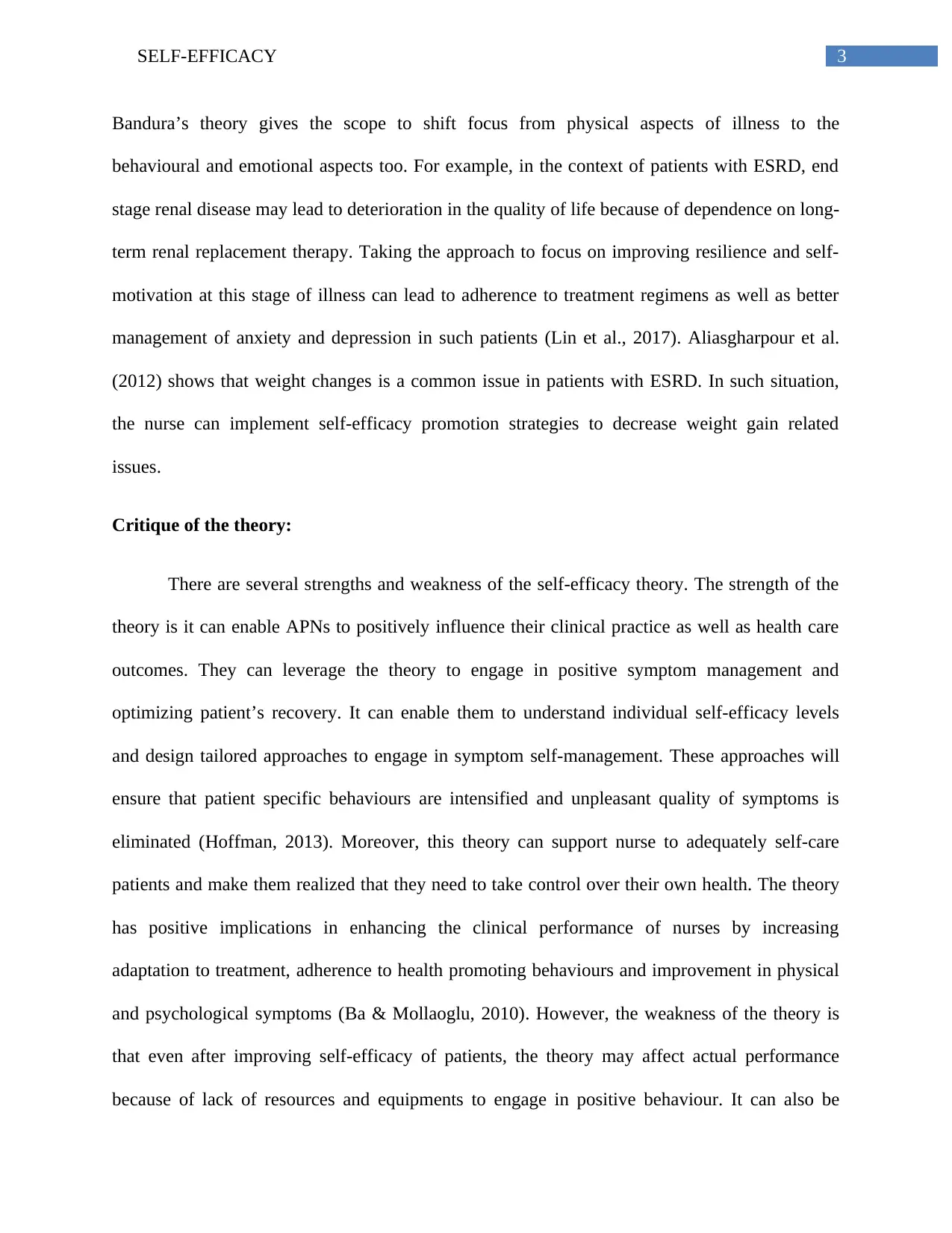
3SELF-EFFICACY
Bandura’s theory gives the scope to shift focus from physical aspects of illness to the
behavioural and emotional aspects too. For example, in the context of patients with ESRD, end
stage renal disease may lead to deterioration in the quality of life because of dependence on long-
term renal replacement therapy. Taking the approach to focus on improving resilience and self-
motivation at this stage of illness can lead to adherence to treatment regimens as well as better
management of anxiety and depression in such patients (Lin et al., 2017). Aliasgharpour et al.
(2012) shows that weight changes is a common issue in patients with ESRD. In such situation,
the nurse can implement self-efficacy promotion strategies to decrease weight gain related
issues.
Critique of the theory:
There are several strengths and weakness of the self-efficacy theory. The strength of the
theory is it can enable APNs to positively influence their clinical practice as well as health care
outcomes. They can leverage the theory to engage in positive symptom management and
optimizing patient’s recovery. It can enable them to understand individual self-efficacy levels
and design tailored approaches to engage in symptom self-management. These approaches will
ensure that patient specific behaviours are intensified and unpleasant quality of symptoms is
eliminated (Hoffman, 2013). Moreover, this theory can support nurse to adequately self-care
patients and make them realized that they need to take control over their own health. The theory
has positive implications in enhancing the clinical performance of nurses by increasing
adaptation to treatment, adherence to health promoting behaviours and improvement in physical
and psychological symptoms (Ba & Mollaoglu, 2010). However, the weakness of the theory is
that even after improving self-efficacy of patients, the theory may affect actual performance
because of lack of resources and equipments to engage in positive behaviour. It can also be
Bandura’s theory gives the scope to shift focus from physical aspects of illness to the
behavioural and emotional aspects too. For example, in the context of patients with ESRD, end
stage renal disease may lead to deterioration in the quality of life because of dependence on long-
term renal replacement therapy. Taking the approach to focus on improving resilience and self-
motivation at this stage of illness can lead to adherence to treatment regimens as well as better
management of anxiety and depression in such patients (Lin et al., 2017). Aliasgharpour et al.
(2012) shows that weight changes is a common issue in patients with ESRD. In such situation,
the nurse can implement self-efficacy promotion strategies to decrease weight gain related
issues.
Critique of the theory:
There are several strengths and weakness of the self-efficacy theory. The strength of the
theory is it can enable APNs to positively influence their clinical practice as well as health care
outcomes. They can leverage the theory to engage in positive symptom management and
optimizing patient’s recovery. It can enable them to understand individual self-efficacy levels
and design tailored approaches to engage in symptom self-management. These approaches will
ensure that patient specific behaviours are intensified and unpleasant quality of symptoms is
eliminated (Hoffman, 2013). Moreover, this theory can support nurse to adequately self-care
patients and make them realized that they need to take control over their own health. The theory
has positive implications in enhancing the clinical performance of nurses by increasing
adaptation to treatment, adherence to health promoting behaviours and improvement in physical
and psychological symptoms (Ba & Mollaoglu, 2010). However, the weakness of the theory is
that even after improving self-efficacy of patients, the theory may affect actual performance
because of lack of resources and equipments to engage in positive behaviour. It can also be
Secure Best Marks with AI Grader
Need help grading? Try our AI Grader for instant feedback on your assignments.
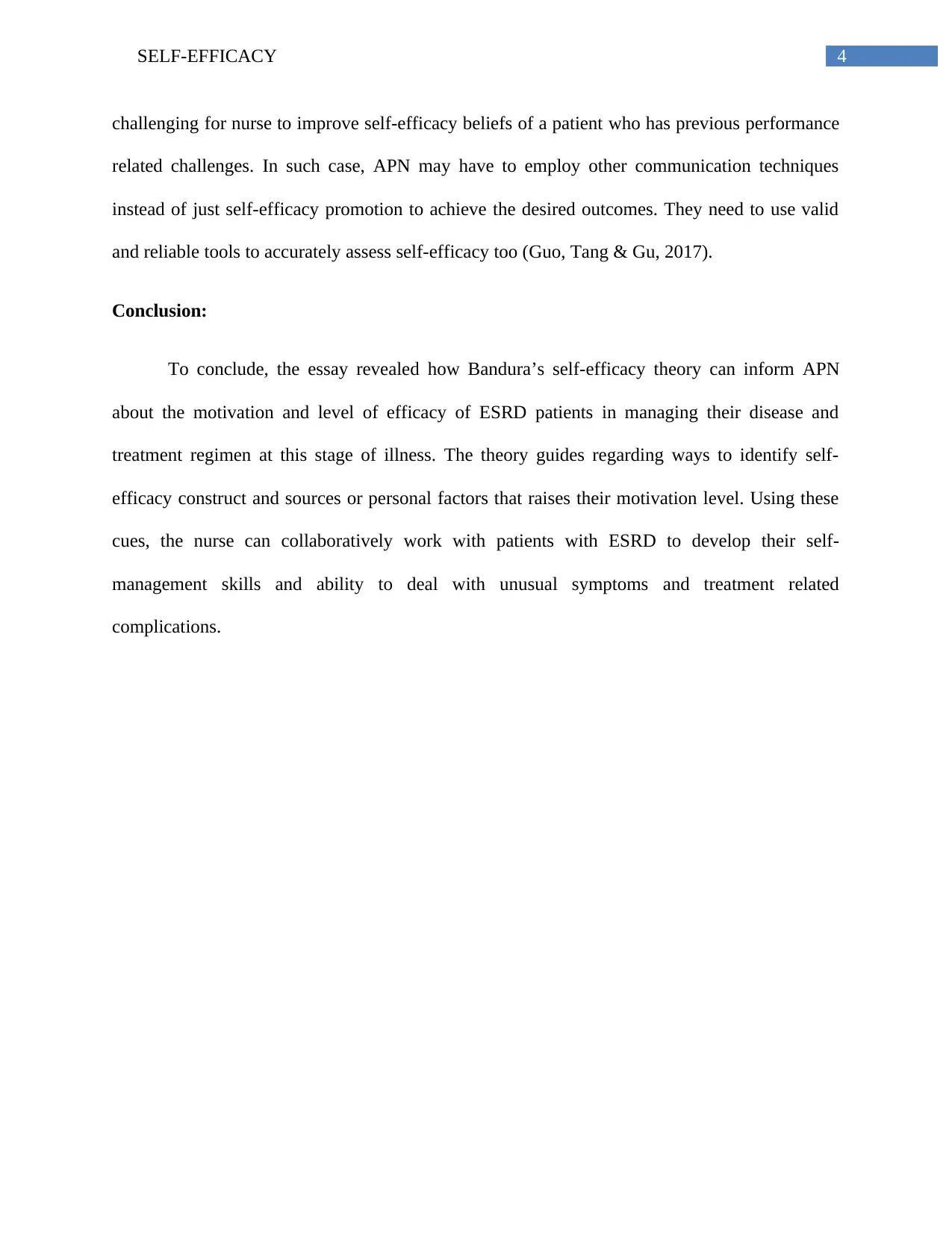
4SELF-EFFICACY
challenging for nurse to improve self-efficacy beliefs of a patient who has previous performance
related challenges. In such case, APN may have to employ other communication techniques
instead of just self-efficacy promotion to achieve the desired outcomes. They need to use valid
and reliable tools to accurately assess self-efficacy too (Guo, Tang & Gu, 2017).
Conclusion:
To conclude, the essay revealed how Bandura’s self-efficacy theory can inform APN
about the motivation and level of efficacy of ESRD patients in managing their disease and
treatment regimen at this stage of illness. The theory guides regarding ways to identify self-
efficacy construct and sources or personal factors that raises their motivation level. Using these
cues, the nurse can collaboratively work with patients with ESRD to develop their self-
management skills and ability to deal with unusual symptoms and treatment related
complications.
challenging for nurse to improve self-efficacy beliefs of a patient who has previous performance
related challenges. In such case, APN may have to employ other communication techniques
instead of just self-efficacy promotion to achieve the desired outcomes. They need to use valid
and reliable tools to accurately assess self-efficacy too (Guo, Tang & Gu, 2017).
Conclusion:
To conclude, the essay revealed how Bandura’s self-efficacy theory can inform APN
about the motivation and level of efficacy of ESRD patients in managing their disease and
treatment regimen at this stage of illness. The theory guides regarding ways to identify self-
efficacy construct and sources or personal factors that raises their motivation level. Using these
cues, the nurse can collaboratively work with patients with ESRD to develop their self-
management skills and ability to deal with unusual symptoms and treatment related
complications.
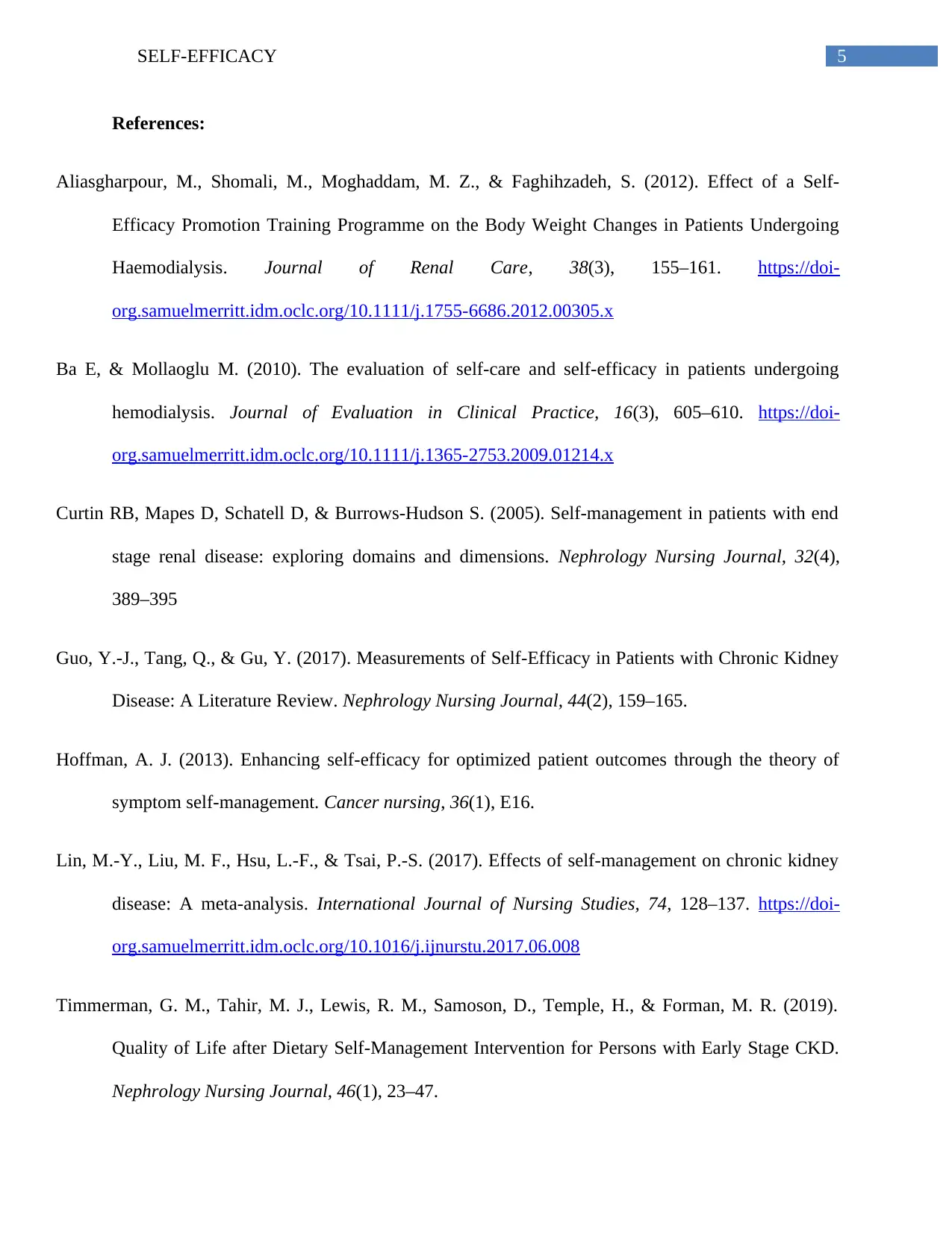
5SELF-EFFICACY
References:
Aliasgharpour, M., Shomali, M., Moghaddam, M. Z., & Faghihzadeh, S. (2012). Effect of a Self-
Efficacy Promotion Training Programme on the Body Weight Changes in Patients Undergoing
Haemodialysis. Journal of Renal Care, 38(3), 155–161. https://doi-
org.samuelmerritt.idm.oclc.org/10.1111/j.1755-6686.2012.00305.x
Ba E, & Mollaoglu M. (2010). The evaluation of self-care and self-efficacy in patients undergoing
hemodialysis. Journal of Evaluation in Clinical Practice, 16(3), 605–610. https://doi-
org.samuelmerritt.idm.oclc.org/10.1111/j.1365-2753.2009.01214.x
Curtin RB, Mapes D, Schatell D, & Burrows-Hudson S. (2005). Self-management in patients with end
stage renal disease: exploring domains and dimensions. Nephrology Nursing Journal, 32(4),
389–395
Guo, Y.-J., Tang, Q., & Gu, Y. (2017). Measurements of Self-Efficacy in Patients with Chronic Kidney
Disease: A Literature Review. Nephrology Nursing Journal, 44(2), 159–165.
Hoffman, A. J. (2013). Enhancing self-efficacy for optimized patient outcomes through the theory of
symptom self-management. Cancer nursing, 36(1), E16.
Lin, M.-Y., Liu, M. F., Hsu, L.-F., & Tsai, P.-S. (2017). Effects of self-management on chronic kidney
disease: A meta-analysis. International Journal of Nursing Studies, 74, 128–137. https://doi-
org.samuelmerritt.idm.oclc.org/10.1016/j.ijnurstu.2017.06.008
Timmerman, G. M., Tahir, M. J., Lewis, R. M., Samoson, D., Temple, H., & Forman, M. R. (2019).
Quality of Life after Dietary Self-Management Intervention for Persons with Early Stage CKD.
Nephrology Nursing Journal, 46(1), 23–47.
References:
Aliasgharpour, M., Shomali, M., Moghaddam, M. Z., & Faghihzadeh, S. (2012). Effect of a Self-
Efficacy Promotion Training Programme on the Body Weight Changes in Patients Undergoing
Haemodialysis. Journal of Renal Care, 38(3), 155–161. https://doi-
org.samuelmerritt.idm.oclc.org/10.1111/j.1755-6686.2012.00305.x
Ba E, & Mollaoglu M. (2010). The evaluation of self-care and self-efficacy in patients undergoing
hemodialysis. Journal of Evaluation in Clinical Practice, 16(3), 605–610. https://doi-
org.samuelmerritt.idm.oclc.org/10.1111/j.1365-2753.2009.01214.x
Curtin RB, Mapes D, Schatell D, & Burrows-Hudson S. (2005). Self-management in patients with end
stage renal disease: exploring domains and dimensions. Nephrology Nursing Journal, 32(4),
389–395
Guo, Y.-J., Tang, Q., & Gu, Y. (2017). Measurements of Self-Efficacy in Patients with Chronic Kidney
Disease: A Literature Review. Nephrology Nursing Journal, 44(2), 159–165.
Hoffman, A. J. (2013). Enhancing self-efficacy for optimized patient outcomes through the theory of
symptom self-management. Cancer nursing, 36(1), E16.
Lin, M.-Y., Liu, M. F., Hsu, L.-F., & Tsai, P.-S. (2017). Effects of self-management on chronic kidney
disease: A meta-analysis. International Journal of Nursing Studies, 74, 128–137. https://doi-
org.samuelmerritt.idm.oclc.org/10.1016/j.ijnurstu.2017.06.008
Timmerman, G. M., Tahir, M. J., Lewis, R. M., Samoson, D., Temple, H., & Forman, M. R. (2019).
Quality of Life after Dietary Self-Management Intervention for Persons with Early Stage CKD.
Nephrology Nursing Journal, 46(1), 23–47.
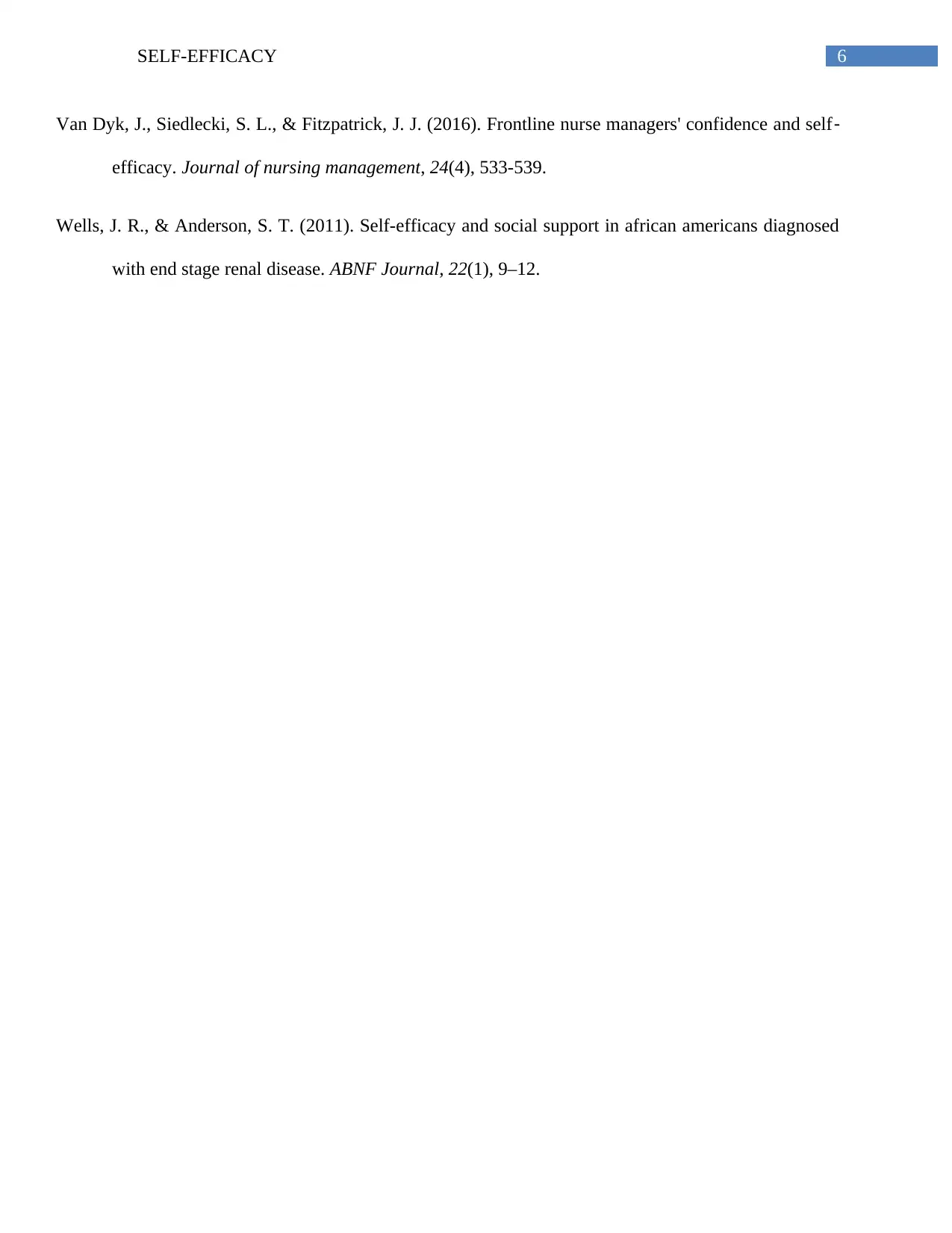
6SELF-EFFICACY
Van Dyk, J., Siedlecki, S. L., & Fitzpatrick, J. J. (2016). Frontline nurse managers' confidence and self‐
efficacy. Journal of nursing management, 24(4), 533-539.
Wells, J. R., & Anderson, S. T. (2011). Self-efficacy and social support in african americans diagnosed
with end stage renal disease. ABNF Journal, 22(1), 9–12.
Van Dyk, J., Siedlecki, S. L., & Fitzpatrick, J. J. (2016). Frontline nurse managers' confidence and self‐
efficacy. Journal of nursing management, 24(4), 533-539.
Wells, J. R., & Anderson, S. T. (2011). Self-efficacy and social support in african americans diagnosed
with end stage renal disease. ABNF Journal, 22(1), 9–12.
1 out of 7
Related Documents
Your All-in-One AI-Powered Toolkit for Academic Success.
+13062052269
info@desklib.com
Available 24*7 on WhatsApp / Email
![[object Object]](/_next/static/media/star-bottom.7253800d.svg)
Unlock your academic potential
© 2024 | Zucol Services PVT LTD | All rights reserved.





